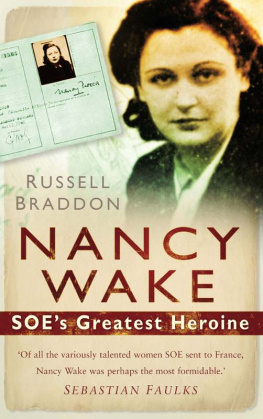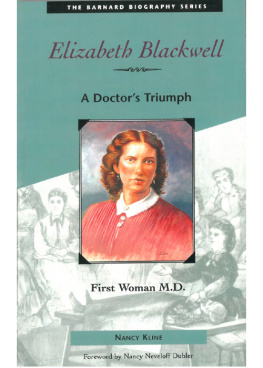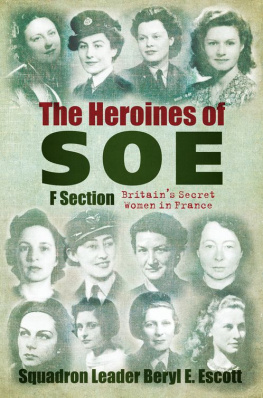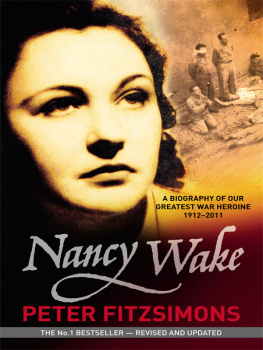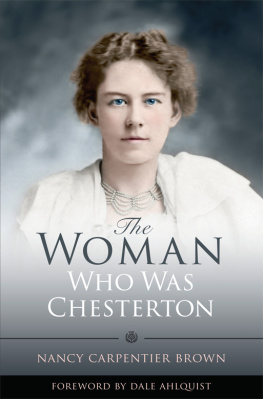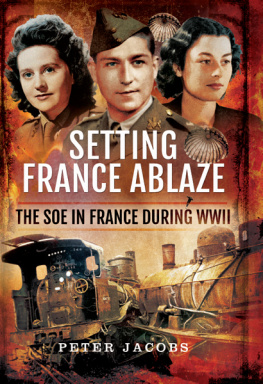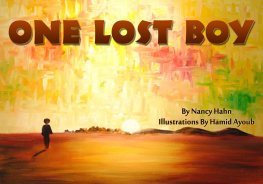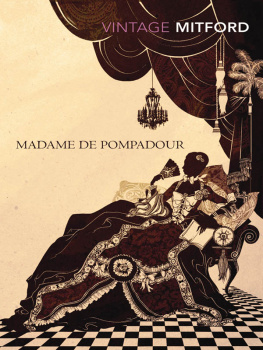NANCY
WAKE
NANCY
WAKE
SOEs Greatest Heroine
RUSSELL
BRADDON

First published by Cassell in 1956
This edition published in 2009
Reprinted 2011
The History Press
The Mill, Brimscombe Port
Stroud, Gloucestershire, GL5 2QG
www.thehistorypress.co.uk
The Estate of Russell Braddon, 1956, 2005, 2009
The right of Russell Braddon to be identified as the Author of this work has been asserted in accordance with the Copyrights, Designs and Patents Act 1988.
This ebook is copyright material and must not be copied, reproduced, transferred, distributed, leased, licensed or publicly performed or used in any way except as specifically permitted in writing by the publishers, as allowed under the terms and conditions under which it was purchased or as strictly permitted by applicable copyright law. Any unauthorised distribution or use of this text may be a direct infringement of the authors and publishers rights, and those responsible may be liable in law accordingly.
EPUB ISBN 978 0 7524 6963 8
MOBI ISBN 978 0 7524 6964 5
Typesetting and origination by The History Press
Printed in Great Britain
AUTHORS NOTE
The story that follows is Nancy Wakes: because of that I have asked her to write the next and only important sentence on this page.
I dedicate this book to everyone in France who helped us, even if it was only by refraining from helping the enemy, for that in itself required courage: but especially I dedicate it to my comrades in the Maquis dAuvergne.

CONTENTS
Part One
NANCYS WAR BEGINS
Part Two
INTERLUDE
Part Three
WITH THE MAQUIS DAUVERGNE


PART ONE
NANCYS WAR BEGINS
CHAPTER I
THE ENEMY ARRIVE
S HES a rebel, shes always laughing and shes very, very femininethats the best way to describe Nancy Wake. Although one could add that she has the disconcertingly direct stare of an infant childcandid, unhurried and perceptiveand a childs serene brow. Her eyes are hazel ordinarily but they go green when she cries and blue when she walks outside on a fine day.
As a twelve-year-old she was a brilliant pupil in an Australian high-school. Even then she cooked the household meals and often had to clean the house and she didnt like these tasks at all. She ran away from home twice.
At eighteen she was a nurse, cheerful and popular with the inmates, in a country lunatic asylum. Hers were not, she maintains, very mad lunatics.
In her early twenties she began a world tour, supporting herself by free-lance journalism, her sales stemming from good looks and personality as much as from an adequate literary talent. She earned enough to live and to keep moving.
When she was twenty-two she took a flat in Paris and, with her first wage packet, bought two wire-haired terriers, one a dog, one a bitch; and these she promptly named Picon and Grenadine, as a compliment to Frances drinking habits. Because Picon was male, she always loved him most and it was he who was to live right through the next fantastic seven years of her own life, so that when he died, after the war, she wept for days. Friends asked her why. After all, he was only a dog. And she replied:
If you love dogs youll know part of the reason. The other part is that when Picon died, the last of my youth died too. By then, of course, she had spent almost the entire war fighting the Nazis in France: she had become a distinguished Resistance leader: she had earned more decorations than any other British service woman: and she had lost her husband to the Gestapo torturers in Marseille. Picon had lived through it all and now he was dead and she felt that the last link with her life as a girl had vanished. So she wept.
But we run ahead of time. When she was twenty-three she was a considerable beauty and had the dubious compliment paid her one evening of being strenuously pursued round and round the Cannes Palm Beach Casino by a wealthy sheik or pasha, she wasnt sure which. Eventually she cooled his ardour by introducing him to her fiance, Henri Fiocca, a Marseille steel industrialist who was equally as wealthy as the sheik or pasha, whichever he was.
She had first met Henri Fiocca at a party. He was fourteen years older than she and his partner, on that occasion, was an incredibly beautiful girl. The next evening he contrived to be at the same restaurant as Nancy and her friends and his companion was another beautiful girl. Nancys group moved on to a night club and later Fiocca turned up againthis time with a third beautiful girl.
For heavens sake, Nancy exploded, how does he do it?
He has great charm, one of her companions pointed out.
Im not saying he hasnt, she replied. But all those gorgeous-looking girls. How does he do it? Her partner shrugged as only a Frenchman can. Henri has many more girls than you have seen, he assured her.
For weeks it went on. Finally Nancy, who cannot bear not to understand, tackled Fiocca bluntly on the subject.
How do you get on to so many beautiful girls?
They ring me up.
They ring you up?
Yes, he sighed. Every girl, except the one I want, rings me up. He looked at her quizzically as he spoke and she, understanding at once what he meant, stared at him very straightly in reply.
If you want to speak to me on the phone, Fiocca, she announced finally, you will ring me up! He did.
He courted her and wooed her and a little while laterdespite his enraged familys objectionshe announced his engagement to her. Nancy had never known that any man could be so charming and so amusing, or that anyone could mean so much to her. It was early 1939 and they planned to marry in 1940.
Now her life was transformed. From being one of the least affluent journalists in the world, Nancy had become the fiance of one of the wealthiest men in Marseille. Money had never been of any importance to her: but now she realized that lots of it is more pleasantly unimportant than none.
Get us an apartment and furnish it, Fiocca ordered. By June she had obtained the lease of a huge flat in a luxury block on the hill that overlooks all of Marseille and its harbour. She had even ordered lavish drapes and Persian rugs and a bar for the drawing-room; together she and Henri chose a huge table and the best monogrammed Svres china and crystal glasses for the dining-room; the apartment had a bathroom window that looked out over the Old Port and Nancy employed servants to look after them when, in the New Year, she would be married. Purring with contentment she decided that now, at last, the harsh memories of her childhood housekeeping were to be expunged for ever. Never again, she thought, need she go without anything.
Meantime Henri made her life a constant joy. He taught her the best places to eat and thought nothing of driving a hundred and fifty miles to find the meal he desired for her. That was customary in the wealthy society of those days, but in these matters Fiocca was an expert and a fanatic.
He often took her, at week-ends, to Cannes, where she stayed with a Madame Digard and her daughter, Micheline. They swam during the day (this was something she did better than Henri, which pleased her) and went to the Casino in the evening.
Next page
